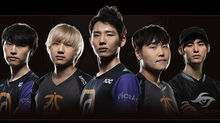Esports: Should it imitate mainstream sport?
- Play4Win - Admin

- Jun 30, 2017
- 3 min read
All over the esports shop, we have new leagues and formats that are getting closer and closer to the traditional structures used by the world of sports.
The Overwatch League, League of Legends in Asia, and even the Vainglory Home City programme are all examples of franchise models where the league has complete control and regulates who can own teams.
This model is one that makes a lot of sense for league organisers because, at its core, sports are entertainment. Fans want to build a connection with their favourite team and follow them through the bad and the good.
In esports we see teams come and go with regularity with roster shuffles galore. It can make it difficult for fans to stay invested in a particular esport when there are constantly changing faces. Think about Hearthstone in 2016, where we had a never-ending shuffle of "Muffinman versus Muffinman" to quote Octavian "Kripparrian" Morosan in his video at the time.

It had a negative impact on the viewership because casual viewers need to be able to measure why a match is important, and that is not really possible if both competitors are unknowns. Hearthstone pro and content creator 'Kripparrian' brought some of Hearthstone's spectator issues to light in 2016.
The models make sense from a stability perspective. Fans will become attached longer-term and that will generally mean more "revenue per enthusiast." To give perspective on that, in 2015 basketball got $15 revenue from each fan on average while esports gained $2.20 from their fans.
The question is, will it work? Can we turn esports into sports? Franchising leagues is an interesting step in the right direction and makes esports far more attractive to the folks who own sports teams.
Over the next two years, I would anticipate esports growing faster than anyone thinks possible because the amount of money that will be injected into the industry from franchising is going to be astronomical.
However, it's not all sunshine and rainbows. The biggest difference between sports and esports is simple. No one owns football. Football isn't going to be unplayable if poor decisions are made and some related businesses go into insolvency. It will always be a game that anyone can play if they have a field and a ball. Esports don't have that benefit.
We've all had games that died on us while we were still playing them. Stellar Impact, Tribes Ascend, and Burnout Paradise are examples of games that died and the servers were simply switched off with no option of running your own server.
Games are intellectual property. They are wholly controlled, owned, and managed by the developer, and/or the publisher. There's no way for the public to create a competitor regulatory body or a competing league if those entities decide to restrict it. We have already seen instances of this with Riot Games, who do not allow anyone else to run League of Legends tournaments.

What happens to an esport if the game developer goes out of business?
In reality, probably not that much. If a game has widely successful esport, it's less likely the developer will go out of business because esports generate ongoing revenue.
Even in the event of total financial collapse, successful IP will be sold off and so the esport should continue. The danger is for smaller games that have much smaller communities where it isn't a no-brainer for someone to bail out the dev.
What can we do? Esports can definitely learn from sports because there are many things that sports do fantastically well. There are more methods of interaction available with sport than any other form of entertainment. However, sport is still something that at its most base form requires nothing. Running is a sport and you can do that without anything at all, not even clothes and shoes if that's what you're into.
However, video games need a platform, electricity, usually internet, a screen, a method of interaction. You can't reduce it down as far but do we need to?
Esports have just as much-if not more-interaction available as sports do. You can't spectate the World Cup from any viewpoint you like. It's impractical to have your own personal drone flying around above the players so you can see your perfect angle. You can spectate The International using DotaTV in a party with your friends and direct your own experience.
League structures, revenue streams, merchandising, and the idea of home cities for teams with franchising in the Overwatch League and Vainglory Home City programme are all things we can implement better from the beginning by looking at sports. However, we need to remember that esports have fundamental differences to running around in real life and that it's those differences that make esports so compelling to fans.
Can we turn esports into sports? Maybe we can. But should we? That's the real question we need to answer as time goes on.













































Comments